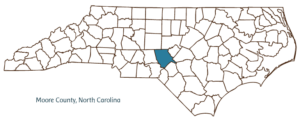Moore County Bankruptcy Lawyers

If you have household or business debts that have become overwhelming or you are facing foreclosure, it may be time to consider taking advantage of bankruptcy laws that will allow you to reorganize your finances and manage your debts.
You may be unsure whether seeking debt relief is the right move for you. Additionally, you may have questions about whether there are other options besides bankruptcy. Sasser Law Firm has board-certified bankruptcy attorneys that can help you take stock of your financial situation and make a new start. An experienced Southern Pines bankruptcy lawyer can help you develop a plan to get a handle on your debt. We know the insides and outs of North Carolina bankruptcy laws and want to help you get back on your feet.
Our attorneys at Sasser Law understand that bankruptcy is not right for everyone. After a free case evaluation with a Southern Pines bankruptcy attorney, you will have an understanding of your legal options and the information you need to make an informed decision about how to proceed.
Why Do Consumers Use Bankruptcy Lawyers Instead of Filing on Their Own?
If you are considering filing for bankruptcy, you need knowledgeable guidance to protect certain assets and determine the most favorable type of bankruptcy protection to seek. The attorneys at Sasser Law Firm include three board-certified specialists in bankruptcy law who are ready to answer your questions and discuss your financial options. We have extensive experience in navigating bankruptcy proceedings. We’ve represented 7,000 individuals and businesses in bankruptcy cases in North Carolina.
We handle Chapters 7, 11, and 13 bankruptcy cases. We work with clients on emergency filings when needed to prevent the seizure of assets, such as repossession of a car. Sasser Law takes on the toughest cases and will fight through appeal, if necessary.
Bankruptcy is not right for everyone in financial distress in Moore County. We truly want what is best for you, our client. Each client works directly with an attorney. We will review your finances and debts during the initial meeting and discuss the options available to you. We are straightforward about our fees and how we operate. We never pressure clients to file. If you are facing bankruptcy, don’t roll the dice with your property and assets. Turn to a Moore County bankruptcy lawyer who has helped many people in situations just like yours.
The Difference Between Chapters 7, 11 & 13 Bankruptcy in Moore County, NC
The federal bankruptcy code contains several types of bankruptcy protection to fit a variety of clients and financial situations. Each type of bankruptcy is referred to by the chapter of the U.S. Bankruptcy Code where it is located.
Chapter 7 bankruptcy is the most common form of bankruptcy in the United States. Also known as a liquidation bankruptcy, a Chapter 7 filing is the most basic. In chapter 7 bankruptcy, an individual liquidates his or her property and distributes it to pay creditors. The individual retains ownership of property categorized as “exempt.” A business that files chapter 7 bankruptcy goes out of business. The business may be operated for a period of time by a trustee who takes charge of liquidating the business’ assets.
A Chapter 7 bankruptcy allows the cancellation of certain unsecured debts such as credit card debt, medical bills, personal loans and business debt. However, the bankruptcy court must decide whether your income is low enough for you to be eligible for Chapter 7. You have to meet certain financial requirements to qualify.
Chapter 13 bankruptcy is also known as a wage earner plan. It allows an individual with regular income to propose a plan to restructure debt and repay part or all of his or her personal debts over an extended period of time, typically three to five years. Chapter 13 enables individuals to prevent foreclosure on houses for the full term of the debt repayment plan. You can catch up on late mortgage payments over the length of your repayment plan.
Once you file a Chapter 13 petition, an automatic stay stops foreclosure proceedings until your repayment plan is approved or rejected by the court. If the court approves your repayment plan, the mortgage lender is then bound by the plan. If you can make all your payments on time and keep up with your regular mortgage payments, you can avoid foreclosure.
Chapter 11 bankruptcy is a reorganization bankruptcy for businesses. It allows a business to remain open as the owner pays debts over time, according to a court-approved plan. In a Chapter 11 bankruptcy, the debtor maintains control of the business and doesn’t sell off the assets. Chapter 11 allows a business to emerge from bankruptcy financially healthier. The company may change terms on debts, such as interest rates and payment values.
How Long Does a Bankruptcy Filing Take?
Certain bankruptcy cases can be filed as quickly as it takes to prepare the paperwork. As soon as the Clerk of Bankruptcy Court receives your chapter 7 bankruptcy petition, the clerk’s office assigns a bankruptcy case number, and your case is filed.
The bankruptcy process in a Chapter 7 case typically takes four to six months to complete. If your case includes assets that the trustee must sell off to clear your debt, then the case may take up to a year or longer to complete.
In a Chapter 11 bankruptcy, once the case is filed, creditors are temporarily prohibited from taking any action. The debtor has four months to come up with a reorganization plan, but that can be extended to 18 months. Once the plan is filed, creditors vote on whether to accept or reject it. There is no set time limit for completing a payment plan, but most take between six months and two years.
The approval process for a Chapter 13 case is usually less complicated because creditors do not vote on the reorganization plan. If your income exceeds the median monthly income in North Carolina for a household of your size, your repayment plan must last five years, unless you can propose a plan that pays 100% of your unsecured debt in a shorter period. If your income is less than the median, you can suggest a three-year plan, even if you can’t fully repay your unsecured creditors in that time. Chapter 13 cases usually take three to five years to complete.
Do You Have a Case for a Settlement Rather Than Bankruptcy?
Bankruptcy has some long-term consequences. It will stay on your credit report for 7 to 10 years and will affect your ability to obtain a credit card for a period of time. You may want to consider trying to settle your debt. Creditors know that if you file for bankruptcy, they will be unable to collect the full amount they are owed. They are often willing to work out repayment terms with you. You should discuss this option with a Southern Pines bankruptcy lawyer.
Where Do Bankruptcy Hearings Occur for Moore County Residents?
The right to file for bankruptcy is protected by federal law. Residents and businesses of Moore County including Southern Pines and Pinehurst file bankruptcy petitions in the U.S. Bankruptcy Court for the Middle District of North Carolina. The Middle District has bankruptcy courts located in Durham, Greensboro, and Winston-Salem, but only the Greensboro and Winston-Salem offices are staffed full-time.

U.S. Bankruptcy Court
Middle District of North Carolina
101 S. Edgeworth St.
Greensboro, NC 27401
U.S. Bankruptcy Court
Middle District of North Carolina
601 W. 4th Street
Winston-Salem, NC 27101
U.S. Bankruptcy Court
Middle District of North Carolina
Venable Center, Dibrell Building, Suite 280
302 East Pettigrew St.
Durham, NC 27701
Moore County is included in the Durham division for the purposes of assigning bankruptcy trustees to cases, scheduling creditors’ meetings and conducting court hearings. A Southern Pines bankruptcy lawyer at Sasser Law is available to meet with you and discuss your options for seeking debt relief and making a fresh start.
What is the North Carolina Homestead Exemption?
The North Carolina Homestead Exemption protects the equity in your home. Under this system, you may exempt up to $35,000 of your home or other real or personal property covered by the homestead exemption. If you are age 65 or older and your spouse is deceased, you may exempt up to $60,000 if you previously owned the property as a tenant by the entirety or as a joint tenant with rights of survivorship.
North Carolina state law allows for a doubling of the homestead exemption for couples filing a joint bankruptcy. This means that a married couple can protect up to $70,000 worth of equity in their home. The Homestead Exemption is automatic in North Carolina when you file. You don’t have to file a separate declaration requesting the Homestead Exemption.

If you are struggling financially and need assistance or qualified legal counsel, call Sasser Law Firm today at (919) 319-7400. You can also reach out to us online to schedule a consultation with one of our Moore County bankruptcy lawyers right away.















